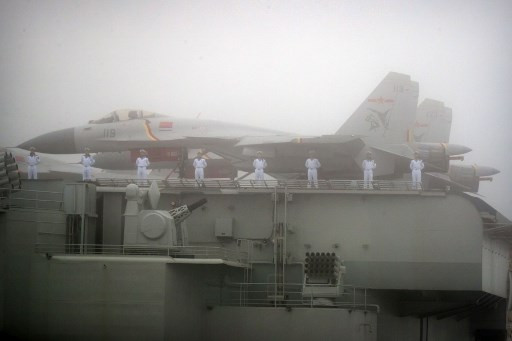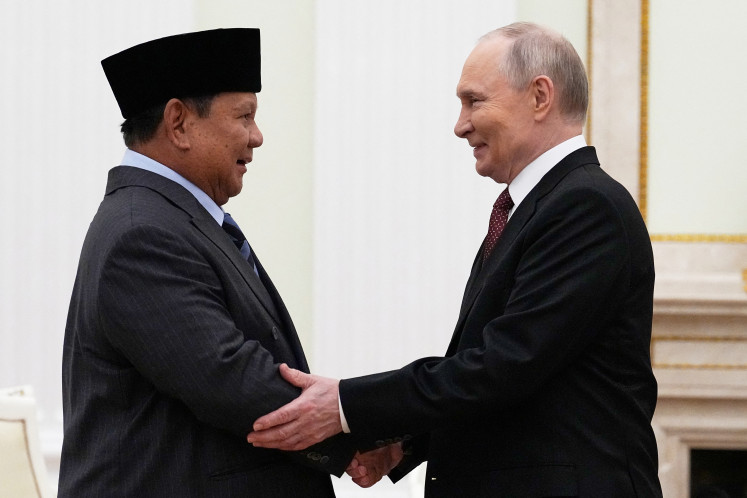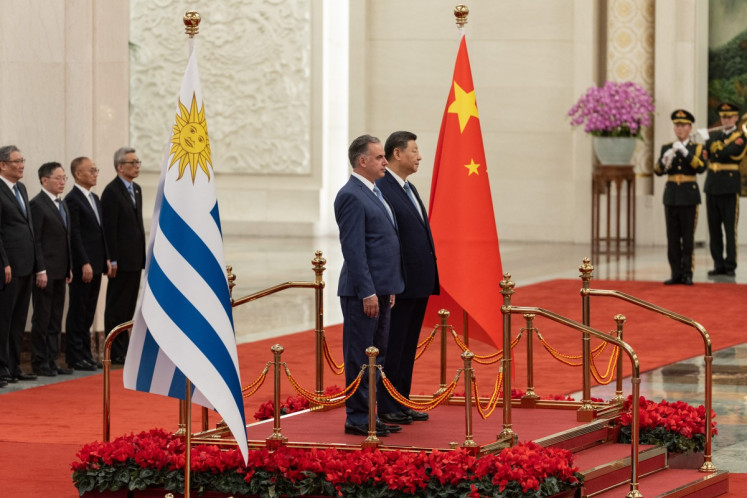Popular Reads
Top Results
Can't find what you're looking for?
View all search resultsPopular Reads
Top Results
Can't find what you're looking for?
View all search resultsInsight: America’s unholy crusade against China
Change text size
Gift Premium Articles
to Anyone
 Sailors stand near fighter jets on the deck of the Chinese People's Liberation Army (PLA) Navy aircraft carrier Liaoning as it participates in a naval parade to commemorate the 70th anniversary of the founding of China's PLA Navy in the sea near Qingdao, in eastern China's Shandong province on April 23, 2019. China celebrated the 70th anniversary of its navy by showing off its growing fleet in a sea parade featuring a brand new guided-missile destroyer.
(AFP/Mark Schiefelbein)
Sailors stand near fighter jets on the deck of the Chinese People's Liberation Army (PLA) Navy aircraft carrier Liaoning as it participates in a naval parade to commemorate the 70th anniversary of the founding of China's PLA Navy in the sea near Qingdao, in eastern China's Shandong province on April 23, 2019. China celebrated the 70th anniversary of its navy by showing off its growing fleet in a sea parade featuring a brand new guided-missile destroyer.
(AFP/Mark Schiefelbein)
M
any white Christian evangelicals in the United States have long believed that America has a God-given mission to save the world. Under the influence of this crusading mentality, US foreign policy has often swerved from diplomacy to war. It is in danger of doing so again.
Last month, Secretary of State Mike Pompeo launched yet another evangelical crusade, this time against China. His speech was extremist, simplistic, and dangerous – and may well put the US on a path to conflict with China.
According to Pompeo, Chinese President Xi Jinping and the Communist Party of China (CPC) harbor a “decades-long desire for global hegemony.” This is ironic. Only one country – the US – has a defense strategy calling for it to be the “preeminent military power in the world,” with “favorable regional balances of power in the Indo-Pacific, Europe, the Middle East, and the Western Hemisphere.” China’s defense white paper, by contrast, states that “China will never follow the beaten track of big powers in seeking hegemony,” and that, “As economic globalization, the information society, and cultural diversification develop in an increasingly multipolar world, peace, development, and win-win cooperation remain the irreversible trends of the times.”
One is reminded of Jesus’s own admonition: “Thou hypocrite, first cast out the beam out of thine own eye; and then shalt thou see clearly to cast out the mote out of thy brother’s eye” (Matthew 7:5). US military spending totaled US$732 billion in 2019, nearly three times the $261 billion China spent.
The US, moreover, has around 800 overseas military bases, while China has just one (a small naval base in Djibouti). The US has many military bases close to China, which has none anywhere near the US. The US has 5,800 nuclear warheads; China has roughly 320. The US has 11 aircraft carriers; China has one. The US has launched many overseas wars in the past 40 years; China has launched none (though it has been criticized for border skirmishes, most recently with India, that stop short of war).
The US has repeatedly rejected or withdrawn from United Nations treaties and UN organizations in recent years, including UNESCO, the Paris climate agreement, and, most recently, the World Health Organization, while China supports UN processes and agencies. US President Donald Trump recently threatened the staff of the International Criminal Court with sanctions.
The world took relatively little notice of Pompeo’s speech, which offered no evidence to back up his claims of China’s hegemonic ambition. China’s rejection of US hegemony does not mean that China itself seeks hegemony. Indeed, outside of the US, there is little belief that China aims for global dominance. China’s explicitly stated national goals are to be a “moderately prosperous society” by 2021 (the centenary of the CPC), and a “fully developed country” by 2049 (the centennial of the People’s Republic).
Assuming that Trump loses in November’s presidential election, Pompeo’s speech will likely receive no further notice. The Democrats will surely criticize China, but without Pompeo’s brazen exaggerations. Yet, if Trump wins, Pompeo’s speech could be a harbinger of chaos. Pompeo’s evangelism is real, and white evangelicals are the political base of today’s Republican Party.
Pompeo’s zealous excesses have deep roots in American history. As I recounted in my recent book A New Foreign Policy, English protestant settlers believed that they were founding a New Israel in the new promised land, with God’s providential blessings. In 1845, John O’Sullivan coined the phrase “Manifest Destiny” to justify and celebrate America’s violent annexation of North America. “All this will be our future history,” he wrote in 1839, “to establish on earth the moral dignity and salvation of man – the immutable truth and beneficence of God. For this blessed mission to the nations of the world, which are shut out from the life-giving light of truth, has America been chosen [...].”
On the basis of such exalted views of its own beneficence, the US engaged in mass enslavement until the Civil War and mass apartheid thereafter; slaughtered Native Americans throughout the 19th century and subjugated them thereafter; and, with the closure of the Western frontier, extended Manifest Destiny overseas. Later, with the onset of the Cold War, anti-communist fervor led the US to fight disastrous wars in Southeast Asia (Vietnam, Laos, and Cambodia) in the 1960s and 1970s, and brutal wars in Central America in the 1980s.
After the September 11, 2001, terrorist attacks, the evangelical ardor was directed against “radical Islam” or “Islamic fascism,” with four US wars of choice – in Afghanistan, Iraq, Syria, and Libya – all of which remain debacles to this day. Suddenly, the supposed existential threat of radical Islam has been forgotten, and the new crusade targets the CPC.
Pompeo’s inflammatory anti-China rhetoric could become even more apocalyptic in the coming weeks, if only to fire up the Republican base ahead of the election. If Trump is defeated, as seems likely, the risk of a US confrontation with China will recede. But if he remains in power, whether by a true electoral victory, vote fraud, or even a coup (anything is possible), Pompeo’s crusade would probably proceed, and could well bring the world to the brink of a war that he expects and perhaps even seeks.
-------
Professor of sustainable development and professor of health Policy and management at Columbia University, and director of Columbia’s Center for Sustainable Development and the United Nations Sustainable Development Solutions Network









